The Battle of Poitiers 732 of the Year, or How Karl Martell Fought Illegal Migration to Europe
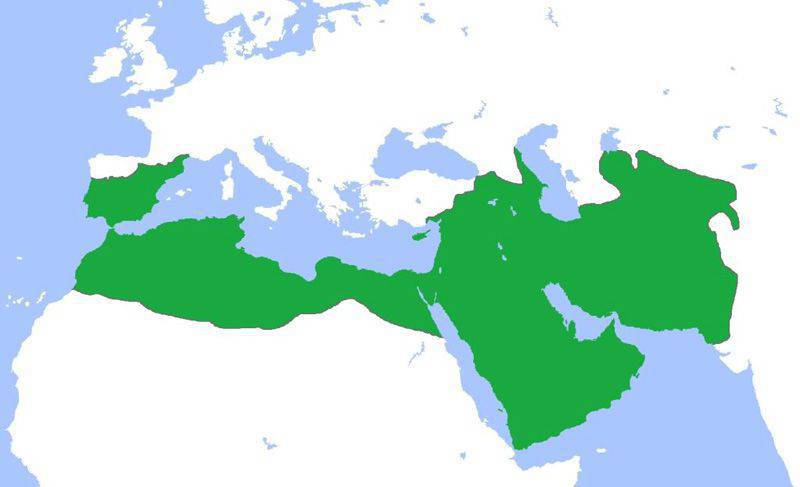
It was a time called the Dark Ages. Three hundred years ago, unable to withstand the mighty blows of the barbarians despised to date, the weakened and already toothless Western Roman Empire sank by worms, cowardice and treason. Like a huge ship, she sunk into the abyss storiesleaving on the surface only fragments in the form of wild and unsteady barbarian kingdoms. Long since boasting of its enlightenment, Europe at that time was a conglomerate of early feudal formations with frequent remnants of a more tribal system. The monasteries were the accumulators of those bits of knowledge about the bygone ancient era, which were destined to survive and survive the centuries of barbarism and the fires of the Inquisition. The new European nobility, yesterday danced briskly in pagan temples, now sedately went to church and tried to speak in mutated, barbarized Latin. The elite built their own castles, where there were vast halls for feasts, but there were no toilets. Neighbors often went to visit each other, for reliability, taking with them rams and stone throwers.
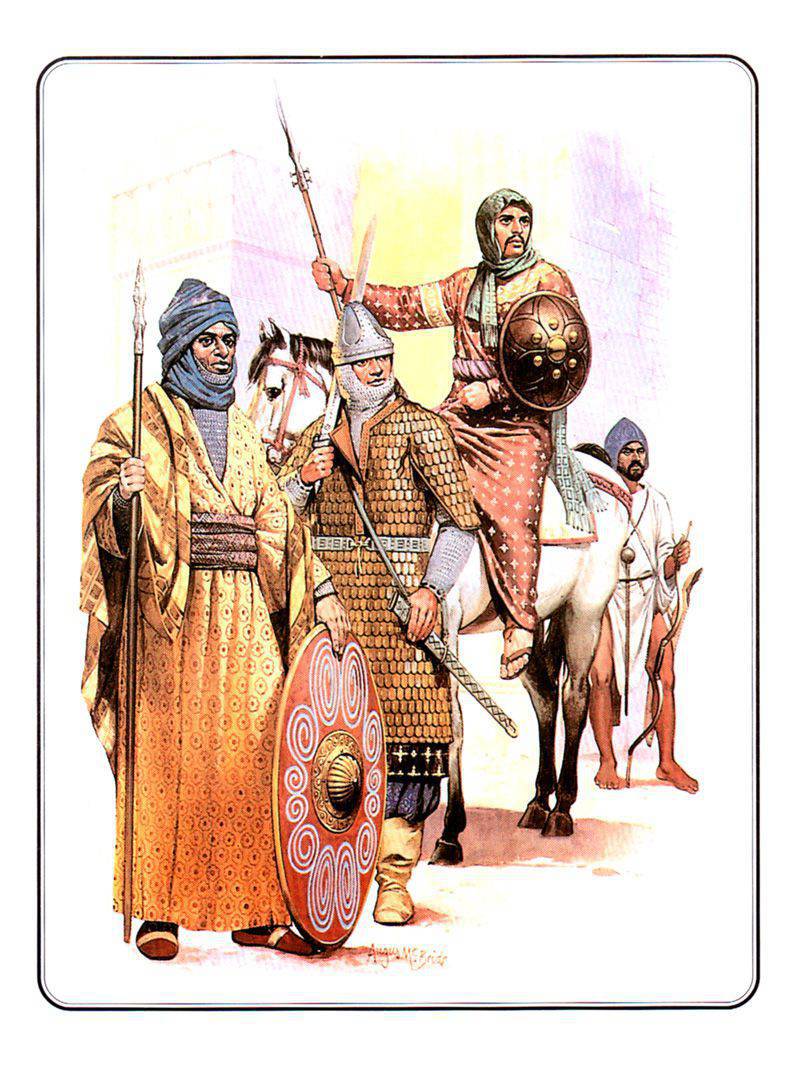
Against the backdrop of all this decadent picturesqueness in the East, a crescent of Islam lit up with a blinding flash. The tribes of nomads and camel drivers by the will of the Prophet Mohammed and the caliphs performing his will in a matter of decades turn into a world force. Sasanid Iran was captured and conquered, the weakening Byzantine Empire was cast aside. Made victorious trips to Syria and Egypt. Like card houses, flimsy states and former Byzantine provinces of North Africa fly from the path of the Arab armies. 19 July 711, at the battle of Guadalete, was broken the back of the Visigoth kingdom in Spain. In less than 5 years, almost the entire Iberian Peninsula (except for the northern regions) came under the control of the Arabs. Less than a hundred years after the death of the Prophet Mohammed, Islam was already standing in front of the gates to Central Europe.
Preparing for the invasion of Gaul
By the time of the events described, the Umayyad Caliphate was obviously the most powerful military force in the Mediterranean and Middle Eastern regions. The heavily armed horsemen, plus the very numerous and well-trained equestrian archers, were the basis of the technology of the Arab Blitzkrieg of the 7th-8th centuries. The military resources of this superpower were so great that the caliphs could afford to simultaneously fight in distant Sindh (now Pakistan) and organize a campaign deep into Europe. At the beginning of the VIII century, during the reign of Caliph Walid I, a new round of expansion began. Subjugating North Africa, the Arabs forced the Strait of Gibraltar and invaded the territory of the Iberian Peninsula.
By 720, the Arabs managed to finally gain a foothold in Spain and, after looking around, they turned their eyes to the north. Behind the Pyrenean Mountains in the territory of the former Roman province of Gaul lay the state of the Franks - a fairly loose early feudal state formation consisting of semi-independent duchies. The ruling Meroving dynasty here in the 7th century lost its significance and power, becoming the crowned puppets in the hands of the Frankish nobility. Karl Martell, like his father Pepin Heristalsky, was the Majord of the Austrazian Franks, the most militant of the Frankish tribes. He was actually the head of state, concentrating in his hands the full military and administrative power. Constantly participating in various military enterprises - whether it was curing the next vassal from the virus of excessive "separatism" or repelling the raids of warlike tribes of Frisians because of the Rhine - Karl Martell not only gained vast military experience, but was able to forge a trained army of diverse tribal armies professionals. Most of the Frankish troops were well-armed infantry, accustomed to act not by a screaming crowd, but in tight formation. The Franks willingly used tactical methods of the era of "Roman totalitarianism", and although they were far from being coherent and precise in the imperial legions, yesterday’s barbarians were able to fight.
Meanwhile, a thunderstorm was approaching. In 720, the Arab army under the command of the viceroy Al-Samha ibn Malik invaded the duchy of Aquitaine (modern Southern France). The ruler of Aquitaine, Duke Evdon of Aquitaine, managed to defeat the Arabs of Toulouse, which they besieged, to kill the enemy commander and force the aggressors to temporarily retreat. Arab expansion does not stop it. In 725, aliens from the Pyrenees are conducting raids into Burgundy. The ruler of Aquitaine found itself in a difficult situation: on the one hand, from the south, the Arabs were pressing more and more, on the other hand, Evdon was strongly opposed to independence “from the center” - he was a vassal of the Frankish king. Like many frontier kings, he wanted to sit quietly on the shore of the pond and watch the battle of predatory geopolitical crocodiles from the side - well, pick up something that will beat the shore. In 729, the governor in Al-Andalusia (the capital of Cordoba) becomes the talented and energetic Abd al-Rahman, a commander who gained fame in the North African campaigns. He puts things in order in Arab Spain, fights against abuse, corruption, and fosters the economic life of the new provinces. For Evdon Aquitaine, this was a very uncomfortable neighbor.
The duke plays a good combination. In 730, he entered into an alliance with the Berber emir Usman ibn Nissa, the governor of the lands subsequently known as Catalonia. To be faithful to the emir, they married the daughter of a duke. Arab raids on Aquitaine stopped. But the idyll bought by actual treachery did not last very long - already in 731, the Arabs had a regional conflict. The son-in-law of the duke, dissatisfied with the “struggle against the domination of local oligarchs,” rebelled against the new governor, Abd al-Rahman, and, as expected, suffered a crushing defeat. Having settled with the rebellion, the winner focused all his attention on the lands north of the Pyrenees. Having deployed enormous forces of heavy cavalry on the border with the Christian lands, receiving large reinforcements from North Africa as part of large contingents of Berber horse archers, Abd al-Rahman is preparing for a decisive march to the north. The number of Arab invasion army in various sources varies from 50 thousand to fantastic 400 thousand people. Such a difference in the assessment of Arab forces was largely due to political reasons: Catholic chroniclers sought to exaggerate the significance of the threat, while the Arab ones, on the contrary, mitigate the unsuccessful outcome of the operation. It should also not be forgotten that the Eastern armies were always accompanied by a huge train of porters and drovers, which was often included in the total number. But both sides admit that the army of Abd al-Rahman was numerous, well prepared and had extensive combat experience. The most reasonable, given the problems of logistics, the number of the Arab army can be defined in 50-60 thousands of people.
Invasion. Francs events
In 732, the Arabs invade Aquitaine. According to eyewitnesses, the invasion army everywhere sowed death and destruction. Duke Evdon Aquitaine hastily gathers his army and gives battle by the Garonne River in the Bordeaux area. The battle soon turned into a battle - the Arab cavalry routed and dispersed the Aquitans. The unlucky political combinator fled from the battlefield. He gets scared to go nowhere and in despair, he goes to the most impartial step for himself. Having exhausted all possibilities for self-resistance, Evdon appealed for help to Paris, to Karl Martell. He agrees to help: the Arabs are a common threat, but in exchange for a categorical recognition of the supremacy of the Franks. Reluctantly, a fighter for "independent" Aquitaine agrees. Franks are preparing for the campaign.
Meanwhile, the Arabs with might and main are devastating Southern Gaul, taking rich trophies and prisoners. Inspired by the initial success, the troops loaded with loot Abd al-Rahman moved around the country. The battle formations were stretched, the vanguard broke away from the less mobile main forces. The farther north, the greater the supply problems. The climate was cool enough for people accustomed to the heat from the south. Obviously, contrary to the opinion of chroniclers describing the campaign that, they say, the Arabs wanted to exterminate and subdue everyone, this campaign was rather a massive sabotage raid rather than a full-fledged conquest, and resembled later Tatar raids from the Crimea.
After the victory of Bordeaux, the threat from the Franks seemed to the Arab commanders insignificant - they critically evaluated the ability of the Franks to deploy a large army. And, as it turned out, it is in vain.
Plentifully plundering Aquitaine, in the autumn of 732, Abd al-Rahman moves north to the city of Tours, where, as you know, there was a rich St. Martin's Basilica, the most revered shrine of Western Europe at that time. Along the way, the Arabs besieged a small town called Poitiers (almost through 600 years one of the greatest battles of the Hundred Years War will take place), devastate its environs, but decide not to waste forces, but concentrate all the efforts on seizing the much more attractive Tour .
Upon learning of the advancement of the enemy, Karl Martell forced marches, widely using the "material traces of the Roman occupation" - beautiful roads, moving toward. A powerful general threat makes various conflicts “on interethnic grounds” between Frankish tribes calm down. The army of Karl Martel, in which the infantry prevails, is determined to give battle.
Abd al-Rahman soon received information about the approaching army of Christians. He was in the vicinity of the Tour at a disadvantageous position, in his opinion. Therefore, the Arab commander decides to retreat to Poitiers. Burdened by a huge booty, the Arab army is retreating slowly, but for some reason Abd al-Rahman does not give the order to leave so many carts and move light. Obviously, this was done in order not to undermine the morale of the warriors. One way or another, the predominantly cavalry army could not shake the forces of Karl Martel from their backs.
Realizing that the retreat becomes more dangerous than the battle, and seeing that the battle can not be avoided, Abd al-Rahman stops on the fields of Poitiers between the rivers Vienne and Clan. Karl Martell skillfully maneuvers his army, taking a more advantageous position on the hill (this played a big role later). The Arabs did not have an accurate idea of the number of enemy troops - using the woodland, the Franks camouflaged their movement and created the illusion that there were more of them than they actually were. This turned out to be another miscalculation by Abd al-Rahman. Thus, the initiative before the battle completely belonged to Karl Martell. He imposed a battle on the enemy, he took a superior position, he also managed to mislead the enemy. Burdened by a huge wagon train, the Arab army could only respond to the actions of Christians, but could not intercept the situation.
Historians and chroniclers estimate the strength of Karl Martel in this battle from 20 to 30 thousand people. He well studied the Arab tactics of combat, the role of numerous and well-prepared cavalry. The Frankish commander makes his main bet on well-prepared infantry, trained to fight in close formation.
Bits
For a week the opponents camped against each other, limiting themselves with threats, intelligence, and skirmishes of advanced secrets. Abd al-Rahman is in no hurry to attack, considering, as before, that there are more francs. Meanwhile, reinforcements are approaching Martell — warriors and militias, various backward detachments. European autumn is in full swing (October), it is getting cold. Believing that there is no way to wait any longer, and wanting to reward his warriors by plundering Tura, the Arab commander decided to give battle. This emphasizes the purely predatory, rather than the aggressive nature of the campaign. The plan of the Arabs was simple enough: to lure the Franks to an open place and crush their powerful cavalry.
On the morning of October 10, 732 of the year from the Arab side beat the drums, giving the signal to attack. Riders lined up in the attacking order, Abd al-Rahman himself led a wave of heavy cavalry. According to the testimony of Arab sources, the Franks, lined up in a large quadrangle, kept a disciplined discipline. Time after time the avalanche of horsemen rolled on them and left. Berber archers showered Karl Martel warriors with a shower of arrows, but they were covered with strong shields. Several times the Arabs even managed to penetrate deep into the enemy's line, but each time these breakthroughs were neutralized in time. The Arabs tried to get to Karl Martel himself and kill him, who was in the center of his army, but the loyal vassals surrounded their leader and did not let his enemies to him.
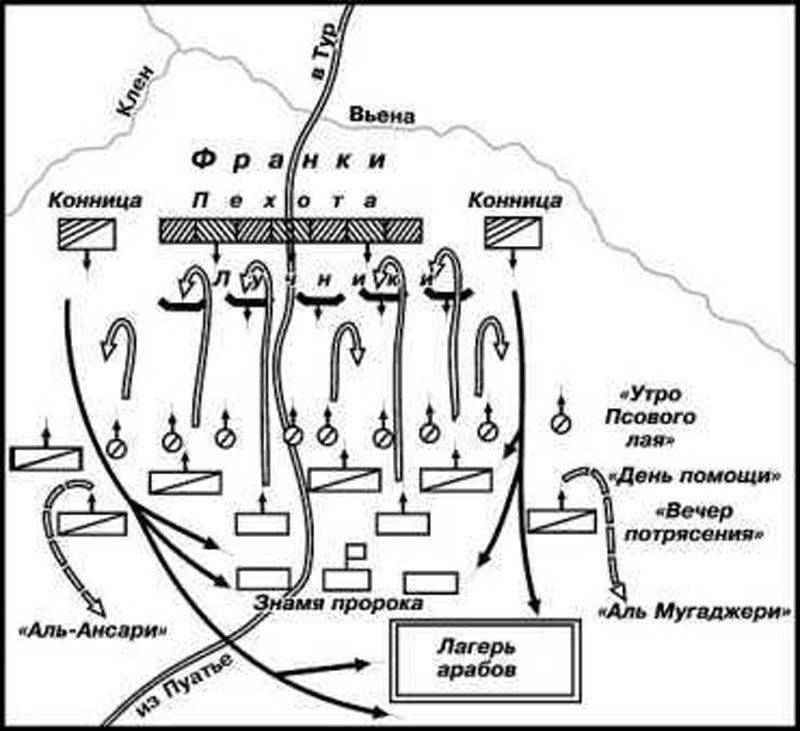
All attempts to lure francs to an open area ended in failure, neither feigned retreat, nor psychological influence in the form of ridicule and threats helped.
Martell gave very clear instructions to his commanders: to keep the line at all costs. And Abd al-Rahman failed what William the Conqueror could do almost four centuries later in the battle of Hastings.
In an effort to reduce the pressure on their battle formations, the Frankish commander sends light cavalry in reserve, along with militiamen bypassing the Arab troops in order to sabotage the enemy camp. In the midst of a battle among the warriors Abd al-Rahman, a rumor spread that the infidels were robbing a camp. And in the camp was stored mining and other trophies, which the Arabs out of greed did not want to throw. Soon, much of the cavalry, spitting on elementary discipline, rushed to the rear to defend their own, acquired with a simple military deed, good. The Arab army has come to utter chaos. Abd al-Rahman tried to stop the rapid movement to the rear of his subordinates. Seeing the growing confusion in the ranks of the enemy, the fresh Frankish cavalry, withdrawn from the reserve, struck a counterstrike. Once surrounded, the Arab commander was killed. The news of his death further upset the ranks of the troops of the raiders. The Arabs who fled without any order suffered heavy losses.
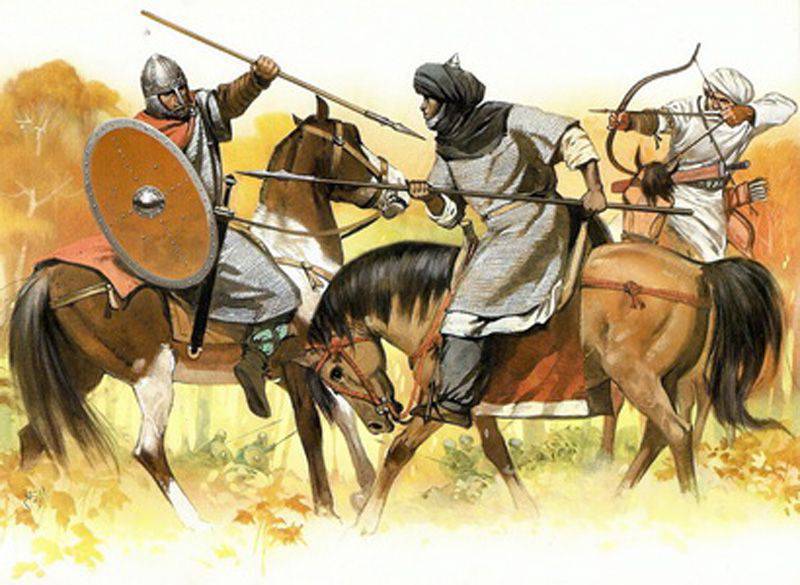
In the camp, where the sabotage detachment that brought the confusion, operated, the felling also began. The militiamen, having completed their task, retreated, leaving infuriated and depressed by the loss of the owners of broken pots, torn tents and runaway slaves to curse the infidels and count losses on the way.
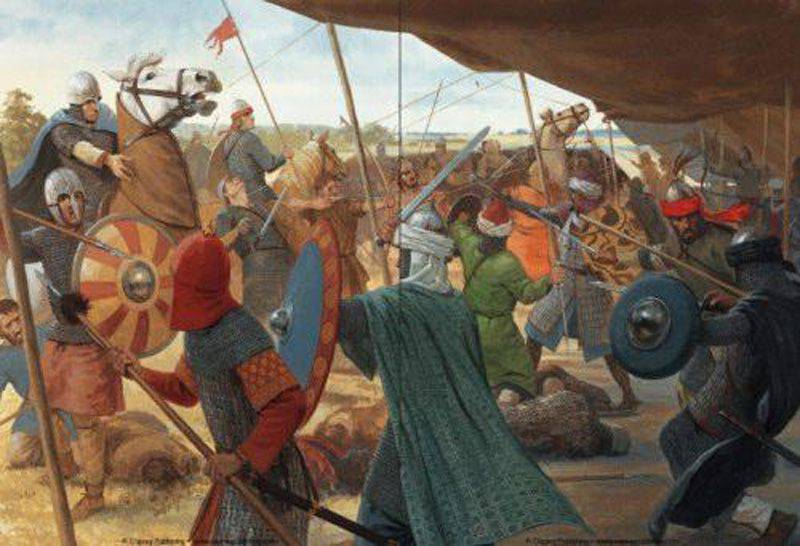
The Frankish army, once again lined up and reestablished the formation, spent the night on vacation - the warriors dressed in wolf and bear skins, the warriors were not afraid of cool nights. They did not use the famous Arabs tents. The next day, the army of Karl Martel was ready to resume the battle. But the field before it was deserted. It was not without reason that the Franks suspected that the enemy had prepared an ambush for them and was finally trying to lure them into open areas and destroy them with cavalry.
As an experienced commander, not neglecting intelligence, unlike his opponents, Martell sent spies to the Arab camp. They soon reported that the enemy’s bivouac was completely empty. Under the cover of night, leaving most of the booty, tents, and many pack animals, the Arabs retreated.
It was a victory. The Franks did not pursue the adversary admitting defeat: Martel had few cavalry, and the volume of captured trophies incredibly invigorated the spirit. The non-pursued Arab army, suffering from food shortages (retreating through looted Aquitaine) and the cold weather that had begun, returned at the end of the autumn to the Pyrenees.
Results and meaning
The battle that went down in history in some sources as the “Battle of Tours”, and in others - the “Battle of Poitiers” (so far the exact place has not been fully established) was significant. It marked the end of the Arab expansion north of the Pyrenees - never again did the Arab armies penetrate so far into Europe. Karl Martell was recognized as a defender of Christianity and the sole ruler of Gaul. The era of rapid alien raids from the south was forever a thing of the past, although the Franks had to make several military campaigns in order to completely discourage the Arabs from dying to the north. Soon the colossal Umayyad Caliphate fell apart into separate Islamic states. The Arab states on the Iberian Peninsula suffered the same “diseases” as the Christian ones: intrigues, feuds, civil wars for rich cities. Soon the amazing Reconquista epoch, peculiar only to Spain, the struggle of the Spanish kingdoms against the Arab presence, which lasted 781 year.
The battle of Poitiers gave great food for thought to lovers and connoisseurs of alternative history. Would Paris be the Arab city of El Paris? Wouldn't Reconquista start from the banks of the Rhine? It seems that the Arab rulers did not have clear plans to seize territories north of the Pyrenees - they were too far from the epicenters of the power of the Umayyad power. These were pronounced predatory, perhaps even preventive campaigns. The Romans had been doing this long before, with their military expeditions to the north of Britain or deep into Germany.
In 1492, the last Moorish stronghold in Spain, Granada, fell. The era of Arab rule and presence in Spain is over. The siege was attended by the still unknown Genoese mercenary Cristobal Colon, who will soon change history.
Information